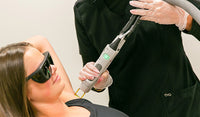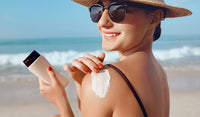Sun Exposure After Laser Hair Removal

SUN EXPOSURE AFTER LASER HAIR REMOVAL
Laser hair removal has become an increasingly popular method for achieving long-term hair reduction. However, many individuals may wonder about the effects of sun exposure on this procedure.
In this blog post, we will explore the relationship between sun exposure and laser hair removal, examining the potential risks, precautions, and best practices to ensure optimal results and maintain skin health.
Understanding Laser Hair Removal:
Laser hair removal is a cosmetic procedure that uses concentrated beams of light to target and destroy hair follicles, inhibiting hair growth. The treatment is effective for various skin and hair types but requires multiple sessions for optimal results. While it offers significant advantages over traditional hair removal methods, such as waxing or shaving, it is essential to be aware of the potential impact of sun exposure on the procedure.
Sun exposure plays a significant role in the effectiveness and safety of laser hair removal treatments. The presence of melanin in our skin is what laser hair removal targets to remove unwanted hair. However, sun exposure can increase melanin production, making the skin darker and more sensitive. This can interfere with the laser's ability to target the hair follicles effectively. Direct sun exposure, especially during the summer months, can lead to increased skin damage, including sunburn and hyperpigmentation.
When undergoing laser hair removal treatment, it's crucial to avoid tanning, tanning beds, and direct sunlight on the treated area. UV rays, both UVA and UVB, can make the skin more susceptible to side effects like burns and can even compromise the results of the treatment.
Skincare after laser hair removal is crucial for maintaining the health and appearance of the treated skin. Using broad-spectrum SPF lotions with at least SPF 30 can help protect the skin from UV rays. It's essential to wear sunscreen and protective clothing, such as a wide-brimmed hat, to shield the treated area from sun damage. IPL and waxing should also be avoided as they can interfere with the light energy used in laser hair removal sessions.
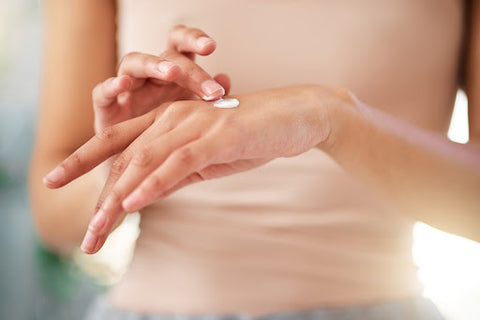
What is Sun Exposure?
Sun exposure refers to the exposure of one's skin to the ultraviolet (UV) radiation emitted by the sun. When we spend time outdoors, our skin is exposed to the sun's rays, which consist of UVA and UVB radiation. While some amount of sun exposure is necessary for the body to produce vitamin D, excessive or unprotected exposure can have harmful effects on the skin.
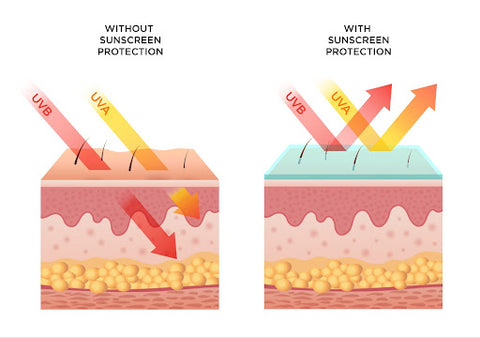
UV radiation can penetrate the skin and cause various short-term and long-term effects. In the short term, excessive sun exposure can result in sunburn or tanning, characterized by redness, pain, skin peeling, or a tan. Sunburns are primarily caused by UVB radiation. In the long term, cumulative sun exposure can lead to premature skin aging, including wrinkles, age spots, and an increased risk of skin cancer.
It is important to note that sun exposure is not limited to sunny days or warm weather. Even on cloudy or overcast days, UV radiation can still reach the Earth's surface and affect the skin. UV rays can also reflect off surfaces like sand, water, and snow, intensifying exposure.

Sun Exposure Before Laser Treatments:
Before undergoing laser hair removal, it is crucial to avoid excessive sun exposure. This means exposure to the sun that lasts 30 minutes or more, even when in the shade. When the skin is tanned or sunburned, it becomes more sensitive, which can increase the risk of complications during the laser hair treatment.
During the summer months, sun exposure becomes even more critical when undergoing laser hair removal treatments. The increased intensity of the sun's harmful rays can lead to heightened skin sensitivity and damage, compromising the effectiveness of the treatment. Melanin production can also accelerate due to sun exposure, making the skin darker and interfering with the laser's ability to target hair follicles accurately. This can result in uneven hair growth and potential side effects like hyperpigmentation. Therefore, adhering to strict sun protection measures, including wearing sunscreen, protective clothing, and avoiding direct sunlight, is crucial to ensuring the success and safety of your laser hair removal sessions during the summer.
Sunburned or even tanned skin is more susceptible to damage from the laser, leading to discomfort, burns, or pigmentation issues. The darkened skin competes with the follicles and absorbs the light, leading to long-term side effects and pigmentation changes.
To ensure the best outcome, it is advisable to avoid sun exposure, tanning beds, and self-tanning products for at least two weeks before your laser hair removal session. Using a broad-spectrum sunscreen with a high SPF and wearing protective clothing when going outside is also recommended.

Sun Exposure After Laser Hair Removal:
Following a laser hair removal session, the treated area will be more sensitive to sunlight. The laser can make the skin temporarily more prone to sunburn, pigmentation changes, and other adverse effects. Therefore, protecting the treated area from sun exposure is crucial for proper healing and to prevent complications.
It is recommended to avoid direct sun exposure for at least two weeks after the treatment. If sun exposure is unavoidable, wearing protective clothing, using broad-spectrum sunscreen with a high SPF, and seeking shade during peak hours can help minimize the risk. Additionally, it is essential to follow the aftercare instructions provided by your laser hair removal specialist to promote healing and reduce the chances of adverse reactions.
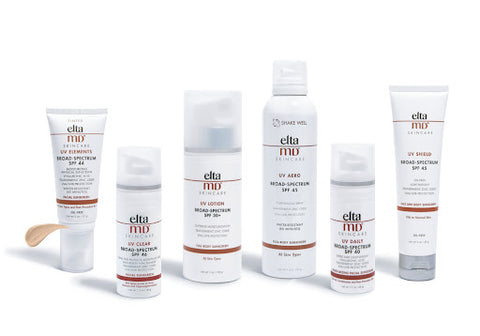
Protecting Your Skin
Embracing a sun-safe lifestyle is crucial for maintaining healthy and radiant skin. Sun protection should become an integral part of your daily routine to safeguard your skin from harmful UV rays and prevent premature aging. Always opt for a broad-spectrum sunscreen with an SPF of 30 or higher, regardless of the weather conditions. This ensures that both UVA and UVB rays are blocked effectively.
Applying sunscreen generously and evenly is crucial, especially to areas that are often overlooked, such as the ears, neck, and tops of your feet. Reapplication is equally important; make it a habit to reapply every two hours and even more frequently if you're swimming or sweating.
Beyond sunscreen, incorporating other sun-safe practices can offer an added layer of protection. Donning protective clothing like wide-brimmed hats, sunglasses with UV protection, and lightweight, long-sleeved garments can shield your skin from direct sun exposure.
Timing your outdoor activities can also make a significant difference. When the sun is at its peak, typically between 10 am and 4 pm, seek shade whenever possible to reduce sun exposure.
Furthermore, take extra precautions when participating in outdoor sports or spending extended periods in the water. Water and snow can reflect sunlight, intensifying its impact on your skin. Therefore, apply sunscreen before engaging in such activities, and reapply as needed.
Remember, sun protection is not just for sunny days. UV rays can penetrate through clouds and cause damage even on overcast days. Even when you're in the car, you can still be exposed to harmful UV rays through the windows. UVA rays, which contribute to premature aging, can penetrate through the glass, so it's important to wear sunscreen or use window shades to protect your skin during long drives and regardless of the weather.
When it comes to laser hair removal, practicing diligent sun protection is especially important. Sun exposure before and after the procedure can affect the results and increase the risk of complications. Avoid direct sun exposure on the treated area for at least two weeks before and after each session.
Always consult with your laser hair removal technician about any concerns related to sun exposure and the procedure. They can provide personalized advice based on your skin type, hair color, and specific needs.
At Simplicity Laser, we take pride in providing customized treatments, performed by licensed technicians, to help individuals achieve their hair removal goals. By following the recommended guidelines, you can enjoy the benefits of laser hair removal while ensuring the long-term health and beauty of your skin.
By making sun protection a priority in your daily routine and adhering to the guidelines set by your laser hair removal technician, you can ensure the best possible outcomes for your skin health and the effectiveness of the treatment. Embrace the sun responsibly, protect your skin diligently, and revel in the beauty of healthy, glowing skin throughout the seasons.
If you've scheduled a laser hair removal session and have recently had sun exposure, it's best to reschedule your appointment. Exposing your skin to the sun before the treatment can increase its sensitivity and raise the risk of adverse reactions during the procedure. You may be rescheduled or unable to be treated if you have sun exposure.
To ensure optimal results and minimize potential complications, wait at least two weeks after sun exposure before proceeding with your laser hair removal session. Always prioritize sun protection and follow your technician's guidance to achieve the best outcome for your skin and hair removal goals.
Simplicity Laser’s dedicated team is prepared to address any inquiries you might have regarding laser hair removal. Reach out to us at 877.539.6934 to connect with our laser advisors and start your journey today.

